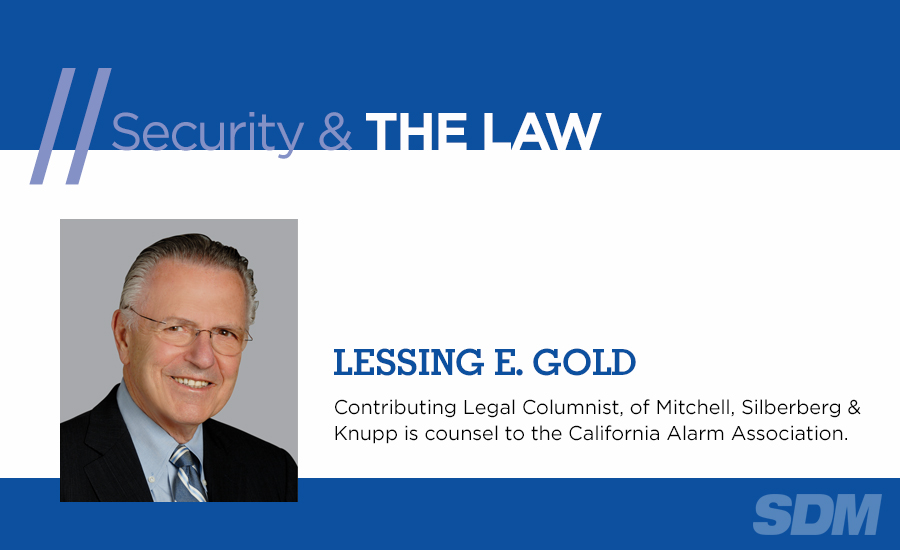An interesting case in the state of Ohio occurred when a deputy sheriff, while responding to an activated burglar alarm (alarm drop) without lights or sirens so as to not alert any intruder in the home, collided with a stopped car.
The deputy testified he approached an intersection where cars were beginning to move after the traffic light turned green. After he passed through the intersection, he looked down at the radio in his cruiser to make sure that it was tuned to the proper channel for communicating about the alarm. When he looked up, he saw that the car in front of him had stopped. He did not have time to stop the cruiser before it collided with the stopped car.
The passenger (plaintiff) in the stopped car filed suit claiming the deputy failed to maintain an assured clear distance before the collision, resulting in injuries to her back and head. The plaintiff also sued the county sheriff, claiming the deputy had acted within the scope of his employment when his negligence caused her injuries.
The defendants moved for summary judgment, claiming the deputy did not act outside the scope of his employment or with malicious purpose, bad faith or in a wanton or reckless manner, as required to overcome statutory immunity, and that the deputy was responding to an emergency call at the time he negligently caused the accident.
The court found that under the law, an alarm drop required an immediate response. The deputy’s response to the alarm drop dispatch qualified as an emergency call under R.C. 2744.01(B)(1)(a). He had a professional obligation to respond to the dispatch.
The trial court granted defendants’ motion for summary judgment, finding that the deputy’s response to the alarm drop qualified as an “emergency call” under the statutory definition of the term and concluded that the deputy’s conduct was not willful, wanton, malicious or in bad faith, even when viewed in light most favorable to the plaintiff.
The plaintiff appealed.
The appellate court indicated that under Ohio law, there are two tests for determining a political subdivision’s immunity from liability. A political subdivision is not liable for damages arising from injury caused by an act of the political subdivision or one of its employees “in connection with the governmental or proprietary function.” Under the second tier of the analysis, the court must consider whether one of five exceptions to immunity applies. If any of the exceptions to immunity do apply, and no defense in that section protects the political subdivision from liability, then the third tier of the analysis requires a court to determine whether any of the defenses apply, thereby providing the political subdivision a defense against liability.
For purposes of a full defense to liability, the law provides that an emergency call is defined as “a call to duty, including, but not limited to, communications from citizens, police dispatches and personal observations by police officers of inherently dangerous situations that demand an immediate response on the part of a police officer. The Supreme Court of Ohio held that the definition of “emergency” involves a situation to which a response by a peace officer is required by the officer’s professional obligation.
There is no requirement in the statute which would limit an “emergency call” only to those occasions where there is an inherently dangerous situation or when human life is in danger.
The court concluded that the trial court did not err when it ruled that the undisputed evidence showed that the deputy’s action during the emergency call did not amount to willful or wanton misconduct and that the trial court did not err when granting summary judgment in favor of the officer and the sheriff and granted them immunity from liability.
READERS ASK
Q: We are an alarm company. One of our new subscribers has just requested we contact our insurance carrier and have them listed as an additional loss payee on our policy. Can this be done?
A: This is not a legal question; it is really an insurance issue. We have on occasion been faced with that issue and we suggest to our clients that they discuss this with their insurance broker. Normally the carrier will allow the customer or subscriber to become an additional loss payee, but there will be an additional expense as if a claim is filed, the carrier must then defend not only your alarm company but your subscriber.
Another issue, of course, is that your contract probably contains a third party indemnification provision whereby your subscriber indemnifies you in the event a claim is made by a third party against you. If your subscriber must then indemnify you, then the insurance company is faced with an additional issue.
I understand that many of the liability policies will include a basic blanket additional insured endorsement, which effectively states that anyone the insured has a contract with requires they be additionally insured. That effectively covers the issue, except however, if that type of policy will incur an additional premium.
As I indicated, the best thing to do is to sit down with your broker and find out if they will include the additional insured and if so, what the cost will be. If there is an extra cost and your subscriber is prepared to undertake the cost, then it may be a worthwhile endeavor. If, of course, the subscriber will not pay the additional cost, from a business standing you have to make a judgment whether or not it is cost effective.



